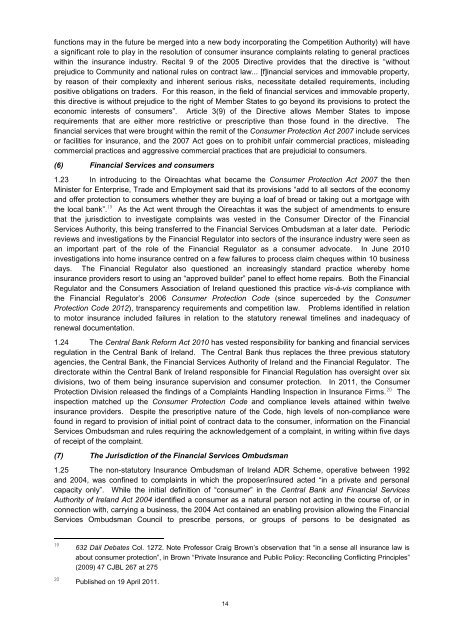Insurance Contracts CP - Law Reform Commission
Insurance Contracts CP - Law Reform Commission
Insurance Contracts CP - Law Reform Commission
Create successful ePaper yourself
Turn your PDF publications into a flip-book with our unique Google optimized e-Paper software.
functions may in the future be merged into a new body incorporating the Competition Authority) will have<br />
a significant role to play in the resolution of consumer insurance complaints relating to general practices<br />
within the insurance industry. Recital 9 of the 2005 Directive provides that the directive is ―without<br />
prejudice to Community and national rules on contract law... [f]inancial services and immovable property,<br />
by reason of their complexity and inherent serious risks, necessitate detailed requirements, including<br />
positive obligations on traders. For this reason, in the field of financial services and immovable property,<br />
this directive is without prejudice to the right of Member States to go beyond its provisions to protect the<br />
economic interests of consumers‖. Article 3(9) of the Directive allows Member States to impose<br />
requirements that are either more restrictive or prescriptive than those found in the directive. The<br />
financial services that were brought within the remit of the Consumer Protection Act 2007 include services<br />
or facilities for insurance, and the 2007 Act goes on to prohibit unfair commercial practices, misleading<br />
commercial practices and aggressive commercial practices that are prejudicial to consumers.<br />
(6) Financial Services and consumers<br />
1.23 In introducing to the Oireachtas what became the Consumer Protection Act 2007 the then<br />
Minister for Enterprise, Trade and Employment said that its provisions ―add to all sectors of the economy<br />
and offer protection to consumers whether they are buying a loaf of bread or taking out a mortgage with<br />
the local bank‖. 19 As the Act went through the Oireachtas it was the subject of amendments to ensure<br />
that the jurisdiction to investigate complaints was vested in the Consumer Director of the Financial<br />
Services Authority, this being transferred to the Financial Services Ombudsman at a later date. Periodic<br />
reviews and investigations by the Financial Regulator into sectors of the insurance industry were seen as<br />
an important part of the role of the Financial Regulator as a consumer advocate. In June 2010<br />
investigations into home insurance centred on a few failures to process claim cheques within 10 business<br />
days. The Financial Regulator also questioned an increasingly standard practice whereby home<br />
insurance providers resort to using an ―approved builder‖ panel to effect home repairs. Both the Financial<br />
Regulator and the Consumers Association of Ireland questioned this practice vis-à-vis compliance with<br />
the Financial Regulator‘s 2006 Consumer Protection Code (since superceded by the Consumer<br />
Protection Code 2012), transparency requirements and competition law. Problems identified in relation<br />
to motor insurance included failures in relation to the statutory renewal timelines and inadequacy of<br />
renewal documentation.<br />
1.24 The Central Bank <strong>Reform</strong> Act 2010 has vested responsibility for banking and financial services<br />
regulation in the Central Bank of Ireland. The Central Bank thus replaces the three previous statutory<br />
agencies, the Central Bank, the Financial Services Authority of Ireland and the Financial Regulator. The<br />
directorate within the Central Bank of Ireland responsible for Financial Regulation has oversight over six<br />
divisions, two of them being insurance supervision and consumer protection. In 2011, the Consumer<br />
Protection Division released the findings of a Complaints Handling Inspection in <strong>Insurance</strong> Firms. 20 The<br />
inspection matched up the Consumer Protection Code and compliance levels attained within twelve<br />
insurance providers. Despite the prescriptive nature of the Code, high levels of non-compliance were<br />
found in regard to provision of initial point of contract data to the consumer, information on the Financial<br />
Services Ombudsman and rules requiring the acknowledgement of a complaint, in writing within five days<br />
of receipt of the complaint.<br />
(7) The Jurisdiction of the Financial Services Ombudsman<br />
1.25 The non-statutory <strong>Insurance</strong> Ombudsman of Ireland ADR Scheme, operative between 1992<br />
and 2004, was confined to complaints in which the proposer/insured acted ―in a private and personal<br />
capacity only‖. While the initial definition of ―consumer‖ in the Central Bank and Financial Services<br />
Authority of Ireland Act 2004 identified a consumer as a natural person not acting in the course of, or in<br />
connection with, carrying a business, the 2004 Act contained an enabling provision allowing the Financial<br />
Services Ombudsman Council to prescribe persons, or groups of persons to be designated as<br />
19<br />
20<br />
632 Dáil Debates Col. 1272. Note Professor Craig Brown‘s observation that ―in a sense all insurance law is<br />
about consumer protection‖, in Brown ―Private <strong>Insurance</strong> and Public Policy: Reconciling Conflicting Principles‖<br />
(2009) 47 CJBL 267 at 275<br />
Published on 19 April 2011.<br />
14

















